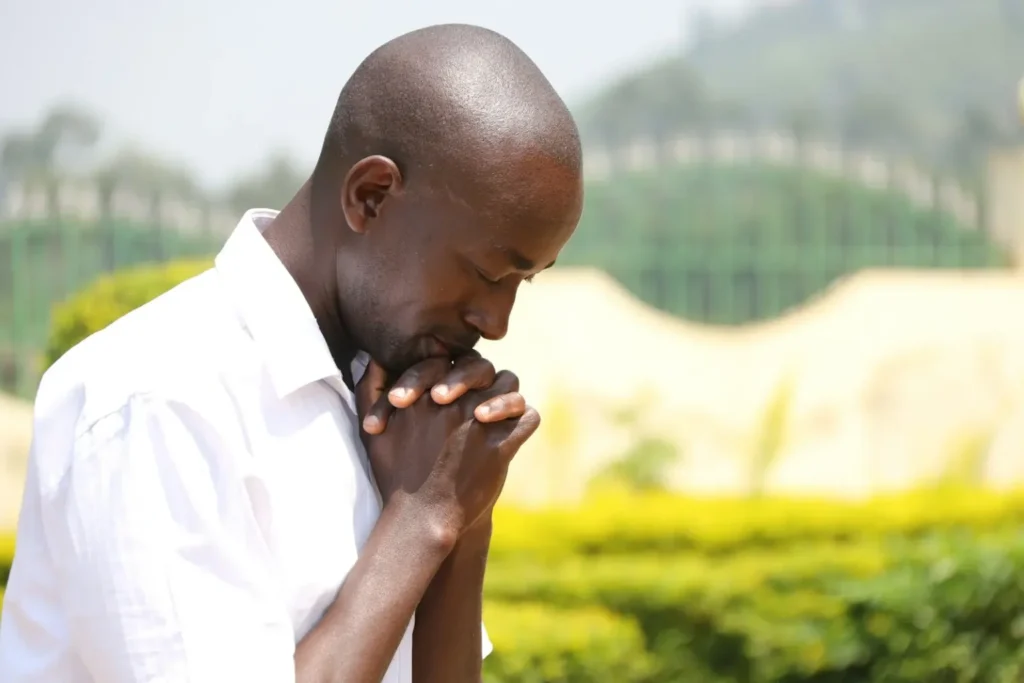In the hustle and bustle of our daily lives, faith often becomes our steady anchor—a source of comfort, inspiration, and strength. Whether it’s rooted in spiritual beliefs, personal philosophies, or a deep trust in the universe, faith shapes how we navigate challenges and celebrate moments of joy. Let’s dive into what makes faith such a powerful force in our lives. Read More
Faith isn’t just about religious rituals or doctrines—it’s about believing in something bigger than ourselves. It’s that unwavering trust that carries us through tough times, knowing there’s a light at the end of the tunnel. Whether it’s faith in a higher power, in our own resilience, or in the support of loved ones, it gives us the courage to keep going when life throws us curveballs. Let’s face it—life can be tough. From job uncertainties to health scares and everything in between, faith helps us weather the storms. It’s like having a friend who whispers, “You’ve got this,” even when everything feels overwhelming. It reminds us that setbacks are just temporary bumps on the road to something better. One of the most beautiful aspects of faith is how it brings people together. Whether it’s through a local church, temple, mosque, or even a close-knit group of friends who share similar beliefs, faith creates a sense of community. It’s about finding kindred spirits who lift us up, celebrate our successes, and offer support during challenging times. Faith isn’t stagnant—it grows and evolves with us. It adapts to our changing beliefs, experiences, and perspectives. It’s about asking tough questions, exploring new ideas, and embracing different viewpoints. In a world that’s constantly changing, our faith journey is a reflection of our personal growth and understanding. Nurturing faith isn’t always about grand gestures—it’s often found in the little moments of everyday life. Taking time for quiet reflection, practicing gratitude, and finding ways to help others are all ways to deepen our connection to faith. Whether it’s a daily prayer, a nature walk that fills your soul, or volunteering in your community, these actions can strengthen your faith and bring you closer to what matters most. In our diverse world, faith comes in many colors and beliefs. It’s about respecting and learning from each other’s perspectives, finding common ground, and celebrating our differences. Whether you’re Christian, Muslim, Buddhist, Hindu, or follow a different path altogether, faith teaches us to embrace diversity and foster understanding. Faith is a personal journey—one that’s as unique as each of us. It’s about finding what resonates in your heart, whether it’s through prayer, meditation, or simply living with kindness and compassion. As we navigate life’s ups and downs, let’s lean on our faith to guide us, inspire us, and remind us that we’re never alone on this journey. What is Faith, Really?
Finding Strength in Tough Times
Community and Connection
Growing and Evolving Together
Practical Ways to Nurture Your Faith
Celebrating Diversity
Conclusion: Embracing the Journey
GOC Church
Blogs

The Sanctification
In the hustle and bustle of everyday existence, there exists a quieter, more profound journey—one of sanctification. It’s not just a religious concept; it’s about finding meaning and purpose in our daily lives, amidst the challenges and joys we encounter.
What is Sanctification, Really?
Sanctification isn’t about lofty ideals or unreachable perfection. It’s simply the ongoing process of becoming more connected to what truly matters—whether you call it spiritual growth, personal development, or just finding inner peace. It’s about striving to live with more kindness, compassion, and integrity, both towards ourselves and others. Read More
We’re all on a journey of some sort. For some, it’s a quest for deeper meaning in their work, relationships, or personal beliefs. It’s about asking the big questions—what makes us feel alive? What values do we hold dear? How can we make a positive impact in our communities? Sanctification happens in the small moments—the daily practices that shape who we are. It could be as simple as taking a few minutes each day to reflect, meditate, or express gratitude. It’s about choosing kindness over anger, forgiveness over resentment, and courage over fear, even when it’s tough. Life throws us curveballs—disappointments, setbacks, heartaches. But these are also opportunities for growth. Sanctification teaches us resilience—to bounce back stronger, wiser, and more compassionate than before. It’s about learning from our mistakes, letting go of what no longer serves us, and embracing change with an open heart. Sanctification isn’t one-size-fits-all. It’s beautifully diverse, shaped by different cultures, beliefs, and experiences. What unites us is the shared desire to live with purpose and integrity. It’s about celebrating our differences while finding common ground in our shared humanity. In the end, sanctification is about making it real in our everyday lives. It’s not about being perfect but about being present—with ourselves, with others, and with the world around us. It’s about finding joy in simple pleasures, lending a helping hand when needed, and being true to who we are. So, whether you’re navigating the complexities of work, family, or personal growth, remember—you’re on a journey of sanctification. It’s about finding meaning in the mundane, beauty in the chaos, and peace in the midst of uncertainty. Embrace the journey, trust in your path, and let your life be a testament to the ongoing journey of becoming. The Everyday Quest
Small Steps, Big Changes
Learning from Challenges
Embracing Diversity, Celebrating Unity
Making it Real
Conclusion: Embracing the Journey
- Writer: Russell Bailey

Jesus and Transformation
In a world where personal change often feels daunting, the teachings of Jesus offer a timeless roadmap for transformation. His message of love, forgiveness, and compassion resonates deeply with people from all walks of life, inspiring real-life stories of profound change. Let’s explore how encountering Jesus can genuinely impact and transform individuals today. Read More
Jesus’ message begins with love—a radical, all-encompassing love that challenges us to see beyond differences and embrace each other with kindness. This love isn’t just a concept; it’s a practical call to action. It’s seen in the small acts of kindness between neighbors, the forgiveness extended to those who’ve hurt us, and the compassion shown to the marginalized and overlooked. One of the most powerful aspects of Jesus’ teaching is forgiveness. He offers a path to redemption and renewal, inviting us to let go of our past mistakes and embrace a fresh start. This message of forgiveness isn’t just for others; it’s deeply personal. It’s about letting go of guilt and shame, experiencing the freedom to be our true selves, and finding peace in our hearts. Following Jesus isn’t just about outward actions; it’s about inner transformation. It’s about confronting our own shortcomings, seeking healing from our hurts, and growing spiritually through prayer, reflection, and community. This journey isn’t always easy, but it’s profoundly rewarding as we discover deeper meaning and purpose in our lives. In a world that can often feel divided and harsh, Jesus’ teachings on justice, peace, and equality offer a counter-cultural path forward. It’s about standing up for what’s right, advocating for those who are oppressed, and bringing hope to those who are hurting. Living out his message means making a difference in our families, workplaces, and communities, one small act of love at a time. The impact of Jesus’ teachings isn’t just confined to ancient history or religious texts; it’s alive and relevant today. His message continues to change lives, offering hope, healing, and a renewed sense of purpose to those who seek it. Through love, forgiveness, and spiritual growth, individuals around the world are discovering the transformative power of Jesus in their own lives. As we reflect on Jesus and transformation, we’re reminded that his message isn’t just about belief—it’s about living in a way that reflects his love and compassion in every interaction. It’s about being agents of change and spreading his message of hope to a world that desperately needs it. In embracing Jesus’ teachings, we find not only personal transformation but also a pathway to creating a brighter, more compassionate world—one where love triumphs over hate, forgiveness over bitterness, and hope over despair. Embracing Love and Compassion
Finding Forgiveness and Renewal
Growing Spiritually and Healing Within
Living Out His Message in Everyday Life
Conclusion: Jesus’ Transformative Legacy
- Writer: Scott Stone

Walk in the Spirit
In the hustle and bustle of our daily lives, amidst all the challenges and triumphs, there exists a quieter, more profound path — walking in the Spirit. It’s about navigating life with a deep sense of connection to something greater than ourselves, whether you call it God, the Universe, or simply a higher power. This article explores what it means to walk in the Spirit, why it matters in real life, and how you can bring this practice into your everyday experience. Read More
Connecting Beyond the Surface: Walking in the Spirit is like having a constant conversation with your inner wisdom and the universe around you. It’s about feeling connected in a way that goes beyond what we can see and touch. Living with Heart: It’s about making choices from a place of love and compassion, not just for ourselves but for those around us. It’s treating each moment as a chance to grow, learn, and spread positivity. Finding Peace: Walking in the Spirit brings a sense of peace and calm, even in the midst of chaos. It’s like having an anchor that keeps you steady when life’s waves get rough. Guidance in the Everyday: Life is full of decisions, big and small. Walking in the Spirit helps us make choices that align with our values and bring us closer to our goals and dreams. Strength in Tough Times: When life throws challenges our way — whether it’s loss, stress, or uncertainty — walking in the Spirit provides strength and resilience. It’s knowing that we’re not alone in our struggles. Living Authentically: It’s about being true to ourselves and others, even when it’s hard. It’s choosing kindness, honesty, and forgiveness, even when it’s easier to take a different path. Moments of Reflection: Take a few quiet moments each day to reflect on what matters most to you. It could be through prayer, meditation, or simply being present in the moment. Acts of Kindness: Look for opportunities to brighten someone else’s day — whether it’s a smile, a helping hand, or a listening ear. Small acts of kindness can ripple out into the world. Embracing Gratitude: Cultivate a mindset of gratitude for the good things in your life, big and small. It’s about appreciating the beauty of a sunset, the warmth of a hug, or the joy of shared laughter. Walking in the Spirit isn’t about perfection or following strict rules. It’s a journey — messy, beautiful, and deeply personal. It’s about embracing life with an open heart and a willingness to grow. By nurturing this practice in our everyday lives — through connection, compassion, and authenticity — we can find meaning, purpose, and a sense of peace that enriches our journey. Whether you’re just starting to explore spirituality or looking to deepen your connection, walking in the Spirit offers a path that’s as real and tangible as the ground beneath your feet. It’s about finding your own way to shine brightly in the world and to uplift those around you. What Does “Walking in the Spirit” Mean?
Why Does It Matter?
How Can You Practice It?
In Conclusion
- Writer: Roger Hayes

The Resurrection
Resurrection isn’t just a religious or mythological concept—it’s a powerful symbol that resonates deeply in our daily lives, offering hope and renewal in the face of challenges. Whether you view it through the lens of faith, personal growth, or simply as a metaphor for overcoming obstacles, resurrection holds a universal appeal that speaks to the human spirit. Read More
At its heart, resurrection is about rising again after a period of difficulty or despair. It’s about finding the strength to rebuild after loss, whether that loss is of a loved one, a dream, or a sense of purpose. We’ve all faced moments where life knocked us down, but somehow, we found the resilience to get back up. That’s the essence of resurrection—it’s the belief that after every winter, there’s a spring waiting to bloom. Think about the stories you’ve heard or lived through—those of people who’ve bounced back from setbacks stronger than before. Maybe it’s a friend who turned their passion into a successful career after being let go from a job, or a family member who found love again after a painful divorce. These are real-life examples of resurrection, where individuals have embraced change and turned adversity into opportunity. On an emotional level, resurrection provides comfort in times of grief and uncertainty. It reminds us that endings are not always final—that from every ending, there’s a chance for a new beginning. This belief can be a source of strength during tough times, helping us see beyond our current struggles to a brighter future. While resurrection is often associated with religious beliefs, its message transcends any single faith. It’s a universal theme that speaks to the human experience of growth, transformation, and renewal. Whether you find inspiration in the resurrection story of Jesus Christ, the myth of Osiris in Egyptian culture, or the idea of personal reinvention, the essence remains the same: life’s capacity for renewal is endless. So, how can we embrace the spirit of resurrection in our own lives? It starts with believing in our ability to overcome obstacles and learn from setbacks. It’s about recognizing that failure is not the end of the road, but a stepping stone to something greater. By cultivating resilience and a positive mindset, we can navigate life’s ups and downs with courage and optimism. In conclusion, resurrection isn’t just a concept from ancient texts or religious teachings—it’s a powerful symbol that permeates our everyday existence. It reminds us of our innate capacity for growth, change, and renewal. As we face life’s challenges, let’s remember that every setback is an opportunity for a comeback. With faith, resilience, and a belief in our own potential, we can embrace the spirit of resurrection and discover new beginnings in every chapter of our lives.What Resurrection Means
Resurrection in Everyday Stories
The Emotional Impact
Resurrection: Beyond Religion
Embracing Resurrection in Your Life
Conclusion: A New Beginning Awaits
- Writer: Joseph Walters

The Resurrection
Resurrection isn’t just a religious or mythological concept—it’s a powerful symbol that resonates deeply in our daily lives, offering hope and renewal in the face of challenges. Whether you view it through the lens of faith, personal growth, or simply as a metaphor for overcoming obstacles, resurrection holds a universal appeal that speaks to the human spirit. Read More
At its heart, resurrection is about rising again after a period of difficulty or despair. It’s about finding the strength to rebuild after loss, whether that loss is of a loved one, a dream, or a sense of purpose. We’ve all faced moments where life knocked us down, but somehow, we found the resilience to get back up. That’s the essence of resurrection—it’s the belief that after every winter, there’s a spring waiting to bloom. Think about the stories you’ve heard or lived through—those of people who’ve bounced back from setbacks stronger than before. Maybe it’s a friend who turned their passion into a successful career after being let go from a job, or a family member who found love again after a painful divorce. These are real-life examples of resurrection, where individuals have embraced change and turned adversity into opportunity. On an emotional level, resurrection provides comfort in times of grief and uncertainty. It reminds us that endings are not always final—that from every ending, there’s a chance for a new beginning. This belief can be a source of strength during tough times, helping us see beyond our current struggles to a brighter future. While resurrection is often associated with religious beliefs, its message transcends any single faith. It’s a universal theme that speaks to the human experience of growth, transformation, and renewal. Whether you find inspiration in the resurrection story of Jesus Christ, the myth of Osiris in Egyptian culture, or the idea of personal reinvention, the essence remains the same: life’s capacity for renewal is endless. So, how can we embrace the spirit of resurrection in our own lives? It starts with believing in our ability to overcome obstacles and learn from setbacks. It’s about recognizing that failure is not the end of the road, but a stepping stone to something greater. By cultivating resilience and a positive mindset, we can navigate life’s ups and downs with courage and optimism. In conclusion, resurrection isn’t just a concept from ancient texts or religious teachings—it’s a powerful symbol that permeates our everyday existence. It reminds us of our innate capacity for growth, change, and renewal. As we face life’s challenges, let’s remember that every setback is an opportunity for a comeback. With faith, resilience, and a belief in our own potential, we can embrace the spirit of resurrection and discover new beginnings in every chapter of our lives. What Resurrection Means
Resurrection in Everyday Stories
The Emotional Impact
Resurrection: Beyond Religion
Embracing Resurrection in Your Life
Conclusion: A New Beginning Awaits
- Verse: John 20:24-31

